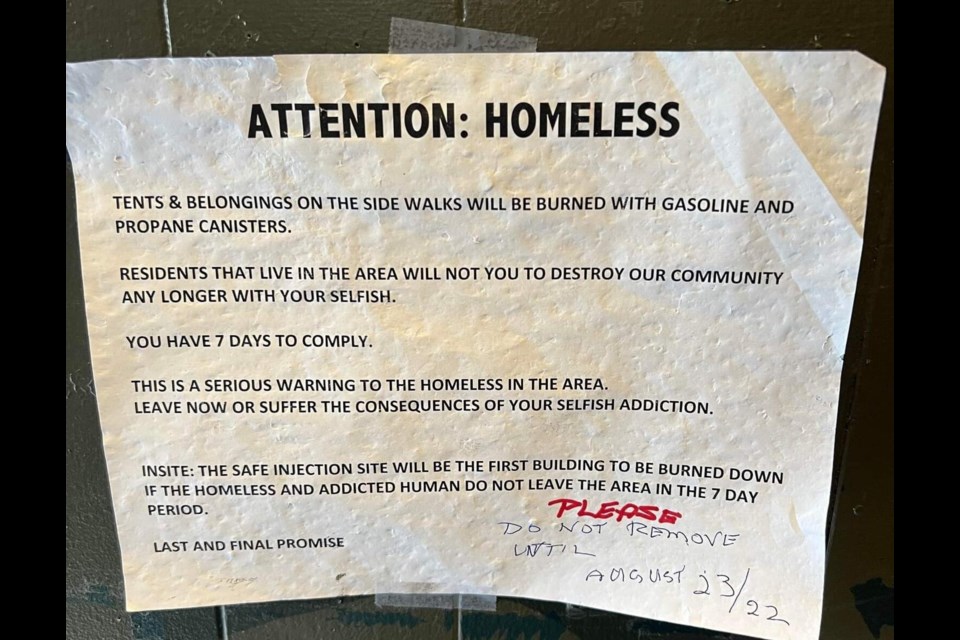A police investigation has begun after posters threatening to burn the belongings and shelters of those living on the streets of the Downtown Eastside (DTES) were thrown from a car this weekend.
The undated, anonymous posters state residents living on the streets have seven days to move.
"Residents that live in the area will not you [sic] to destroy our community any longer with your selfish [sic]" states the poster.
The author of the poster, or flyer, goes on to specifically threaten arson at the legal safe injection program Insite, which operates on East Hastings Street.
The Vancouver Police Department is aware of the posters and has launched an investigation, according to spokesperson Sgt. Steve Addison. The VPD is also urging people to be vigilant in the community.
"We became aware of them over the past few days and it is very concerning," he adds.
The City of Vancouver is also aware of the posters.
"The City condemns these threats in the strongest possible terms. Threats or acts of violence, arson or aggression in any area of The City for any reason is unacceptable," reads a statement from the city.
Trey Helten, manager at the Overdose Prevention Society, says he spoke to people who saw the car with the posters.
"Someone was throwing them out of a car two nights ago," he tells Vancouver Is Awesome. "Someone was driving up and down the East 100 block throwing these pamphlets out of a moving vehicle."
"This is nothing new, this happens all the time."
For those living and working in the DTES, the threats—while concerning—are not new. Vince Tao, a community organizer with the Vancouver Area Network of Drug Users (VANDU), has worked in the area for seven years and says threats of this type, be they online, leaflets, in person, or graffiti, are happening "more of than we would like to see."
"This is nothing new, this happens all the time," he tells Vancouver Is Awesome, explaining these sorts of things have been happening for decades.
Somebody was driving around throwing these out of a car window 2 nights ago - I'm actually speechless for once. pic.twitter.com/JNaalvK5ob
— Trey Helten (@ashtrey5) August 15, 2022
Helten agrees; having experienced homelessness himself in Vancouver.
"Many of my friends were assaulted for absolutely no reason, other than they were homeless and labelled as a drug user," he says, explaining that he escaped these types of attacks because he had a pitbull. He and the dog slept next to each other, and if someone seemed threatening while Helten slept, the dog would wake him and growl.
Others aren't so lucky, and Helten knows many who fear for their life because of anti-homeless violence. For example, one person was told "they'd snap my neck while I'm sleeping." Another, several years ago, was lit on fire in Grandview Park.
With the number of fires that have happened in the DTES this year he's concerned they're connected.
"Violence by police and city workers is the primary concern for people."
Tao directly relates it to the city's actions over the long term and recently, when city workers, along with police, attempted to decamp those living along East Hastings following an order from the fire department.
"When the city, police, and media continue to demonize homelessness, this is the result," he says.
Consequently, Tao says he's urging residents of the community to be cautious but wants to keep people from being overly alarmed. At the same time a woman was set on fire recently, targeted for an act of anti-homeless violence, Tao says.
Currently, the biggest concern in the area, Tao says, is the police and city workers working to decamp the neighbourhood.
"People are concerned of course, but they're also concerned about the decampment too. Ongoing violence by police and city workers is the primary concern for people," he says.
He says the decampment efforts recently, notably last Tuesday have been escalating. Our Streets, a new initiative in the DTES, has launched with a goal to help people feel secure and act as legal witnesses.
"These are volunteer observers who are out on the block to make sure there are witnesses around, primarily to make sure the police do not overstep their role in, let's say, community safety," Tao says.
He notes the threatening posters could be used as the impetus for new decampment efforts, framed as a safety measure.





